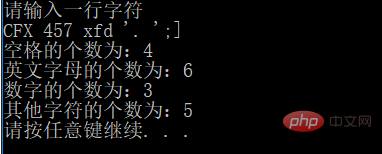
目标:
输入一行字符,统计其中各种字符的个数。
具体代码:
#include<stdio.h>
#include<stdlib.h>
#include<string.h>
#define M 1024
void main() {
char str[M];
fgets(str, M, stdin);
int space = 0;
int letter = 0;
int num = 0;
int other = 0;
for (int i = 0; i < (int)strlen(str); ++i) {
if (str[i] == ' ') {
space += 1;
}
else if (str[i] > 64 && str[i] < 91 || str[i]>96 && str[i] < 123) {
letter += 1;
}
else if (str[i] > 47 && str[i] < 58) {
num += 1;
}
else {
if (str[i] != '\n') {//因为fgets()函数会在末尾自动加上\n,影响判断结果,需要判断是否为换行符
other += 1;
}
}
}
printf("空格的个数为:%d\n", space);
printf("英文字母的个数为:%d\n", letter);
printf("数字的个数为:%d\n", num);
printf("其他字符的个数为:%d\n", other);
system("pause");
}注意:fgets()函数会在字符串末尾(\0前)读入我们在键盘上敲的回车即换行符\n。
运行结果如下:

一套专门解决旅行社网上预定、发布、管理线路的强大系统,系统基于ASP+ACCESS数据库开发,功能强大,操作方便,系统设计完全符合旅行社的运做模式。系统着重体现易操作性,只要您会打字,便操作。系统由以下几个模块组成:1、线路的类别发布和管理2、线路的发布和管理3、线路的属性管理(是精品线路、还是普通线路)4、客户预定线路订单管理,人性化的区分为未处理订但和处理订单5、线路查询功能6、网站留言功能,
 0
0

立即学习“C语言免费学习笔记(深入)”;

推荐教程:c语言教程
以上就是c语言统计字符串中各个字符的个数的详细内容,更多请关注php中文网其它相关文章!

C语言怎么学习?C语言怎么入门?C语言在哪学?C语言怎么学才快?不用担心,这里为大家提供了C语言速学教程(入门到精通),有需要的小伙伴保存下载就能学习啦!

Copyright 2014-2025 https://www.php.cn/ All Rights Reserved | php.cn | 湘ICP备2023035733号